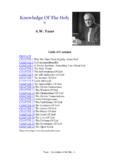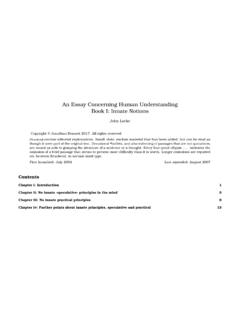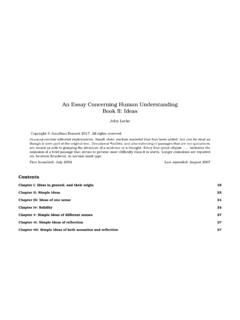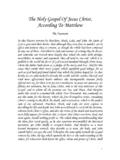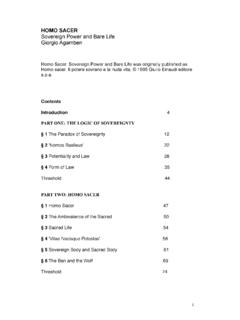Transcription of THE MODERN PRACTICE OF ADULT EDUCATION,
1 THEMODERNPRACTICEOFADULTEDUCATION, ,EnglewoodCliffs,N)07632 IntheBeginningWasPedagogy404 WhatIsAndragogy?Untilrecentlytherewasonl yone modelofassumptionsaboutlearningandthecha racteristicsof learnerson ,firstinBolognaandParis, (meaning"child")andagogus(meaning"leadin g").So"pedagogy"means,literally, ,therefore, theworld,especiallybymissionaries-inthe ,asweshallseelater,wedidn'tgetmuchknowle dgeaboutlearning(incontrasttoreactionsto teaching) ,teachersof aconceptionof thepurposeofeducation-namely,the ,theirteachersfoundthemtoberesistantfreq uentlytothestrategiesthatpedagogyprescri bed,in-cludingfact-ladenlectures,assigne dreadings,drill,quizzes,rotememorizing, , ,oneofthegreatphilosophersofthiscentury, AlfredNorthWhitehead, time-spanofmajorculturalchangewasgreater thanthelife-spanof , ,Whiteheademphasized,"Wearelivinginthefi rstperiodinhumanhistoryforwhichthisassum p-tionisfalse" " "todaythistune-spanisconsiderablyshorter thanthat ofhumanlife,andaccordinglyourtrainingmus tprepareindividualstofaceanoveltyofcondi tions.
2 "tMattemptismadeinExhibit3toportrayWhite head' AncientchangeRomeRenaissanceCenturiesCen tury18th-19thExhibit320thNotethatuptothe earlypartofthetwentiethcenturythetime-sp anofmajorculturalchange( ,massiveinputsofnewknowledge,technologic alinnovation,vo-cationaldisplacement,pop ulationmobility,changeinpoliticalandecon omicsystems,etc.)extendedoverseveralgene rations,whereasinthe ,knowledgegainedatanypointoftimeislargel yobsoletewithinamatterofyears; isnolongerfunctionaltodefineeducationas aprocessoftransmit-tingwhatisknown;itmus tnowbedefinedas themostimportantlearningofall-forbothchi ldrenandadults-islearninghowtolearn, ,publishedbytheAmeri-canAssociationforAd ultEducation, (suchas substitutinginterviewsforquizzes).
3 Obviously,theywerefeelingguiltybecauseth eyhadnotheorytosupporttheirpractices; 'reportsandextractedprinciplesthatwereco mmontothem-myfirstbook,Informal' ,"Introduction," ,BusinessAdriR(NewYork:McGraw-HillBookCo .,1931),pp,viii-xix.'"Successfulteachers ofadults"isoperationallydefinedas teacherswhocanretaintheirstudents;notett +stthisisnot ;, firstinBolognaandnodelofpedagogy-aandago us (meaning'oft forebased!ldrenrelatively~ world, the'chmostlytothereac-weshallseelater,we lionstoteaching)untilallyduringthe1920s, aepedagogicalmodel.~tionofthepurposeofth adstoodthetestof~rdingly,theirteachersda go~prescribed,in-ememorizing,andex-,is,a nddrop-outrates' ~rculturalchangewaswhatle learninlives.
4 ~Whitehead141)_a.+ "++42 THEMODERNPRACTICEOFADULTEDUCATIONA dultEducation,publishedin1950,wasjustsuc halistingofprinciples, ,inthe1960s, 'sTheInquiringMind,publishedbythe ,throughin-depthinterviewswithtwenty-two "continuinglearners,"thathissubjectsfell intothreesub-groups:Thefirst,..thegoal-o rientedarethosewhouse ,theactivity-oriented,arethosewhotakepar tbecausetheyfind inthe circumstancesofthelearningameaningwhichh asnonecessaryconnection,andoftennoconnec tionatall,withthecontentor the , ;the 'sstudents,AllenTough,extendedthis lineof 'sresearchquestionwas,paraphrased:"Howdo adultslearnnaturally-whentheyare notbeingtaught."Hisfirstfindings,reporte dintworeports,LearningWithoutaTeacher(19 67)andTheAdult'sLearningProjects(1971),s howedthat1)almostalladultsengageinfromon etotwentymajorlearningprojectseachyear-w iththeaveragenumberbeingaroundeight;2)on lyabout10percentofthelearningprojectswer eassociatedwitheducationalinstitutions;3 )thereisafairlyuniversal"natural"process oflearning-adultswhoundertaketolearnsome thingontheirowngothroughasimilarsequence ofsteps;4)adultsalmostalwaysturntosomebo dyforhelpatoneormorepointsinthissequence .
5 5)usuallytheygoto"helpers"whohavenotbeen trainedas teachers,butfrequentlywhentheygototeache rstheteachersinterferewiththeirlearningb ysubstitutingtheirownpedagogi-calsequenc eof stepsratherthanflowingwiththelearners' ,developmentalpsychology(especiallythene wgroupoflife-spandevelopmentalpsychologi sts),gerontology,sociology, ,thisre-search-basedknowledgesupportedth eintuitionsoftheearlierteachers,andtheor istsbeganfittingtheknowledgedrawnfrombot hsourcesintoacomprehensive, thisprocessEuropeanadulteducatorsfeltthe needforalabelforthisnewtheoreticalmodelt hatwouldenablethemtotalkaboutitin label"andragogy,"whichisbasedontheGreekw ordaner(withthestemandr-),meaning"man,no tboy" world, ,TheInquiringMind(Madison,Wis.
6 :UniversityofWisconsinPress,1961), term"andragogy,"seemyTheAdultLearner:ANe -glectedSpecies(Houston:GulfPublishingCo .,2nded.,1978), ;andforfurtherelaborationontheetymologyo f"andragogy"seethecorrespondencebetweent he ,pub-lund,throughin-depth ctsfellintothreesub-leansofaccomplish-ar ethosewhotakecaningwhichhasnocontentor thean-seekknowledgeforentthempictorially ralemphasisofeachfinvestigationfromhisEd ucationlaterinthewdoadultslearnnatu-?ort edintworeports,'rojects(1971),showedlear ningprojectseach)out10percentoftheS;3)th ereisafairlytolea~methingonalmost~,aystu rnto5) ),gerontology,soci-Byandlarge,thisre-tea chers,andtheoristsnprehensive,coherented foralabelforthisinparallelwithpeda-~reek wordarter(withofthenewlabelfromnanarticl einAdult(singfrequencyinthestandarddicti onariesess,1961), :ANo-rfurtherelaborationontheDlishersotU arriam-WebsterAssumptionsofPedagogyandAn dragogyACOMPARISONOFTHEASSUMPTIONSOFPEDA GOGYANDANDRAGOGYR egarding.
7 ConceptofthelearnerPedagogyTheroleofthel earneris,bydefinition, ,whenitistobelearned,howitistobelearned, ,incontrasttopedagogyas (andafewincolleges)beganreportingtometha ttheywereexperimentingwithapplyingthecon ceptsofandragogyto theeducationofyouthandfindingthat in ,therebyprovidingtwoalternativemodelsfor testingouttheassumptionsastotheir"fit" ,themodelsareprobablymostusefulwhenseenn otasdichotomousbutratherastwoendsof aspectrum, ,takingtheassumptionregardingdependencyv ersusself-directedness,asix-year-oldmayb ehighlyself-directinginlearningtheruleso fagamebutquitedependentinlearningtouseac alculator;ontheotherhand,aforty-year-old maybeverydependentinlearningtoprogramaco mputerbutcompletelyself-directinginlearn ingto ,wheneverapedagogicalassumptionisthereal isticone,thenpedagogicalstrategiesareapp ropriate, :anideologicalpedagogue-onewhohasadeeplo yaltyandcommitmentto thepedagogicalmodel-maybetemptedtounderr atetheextenttowhichanandragogicalassumpt ionmayberealisticandmay,forexample, thedifferenceinassumptionsbetweenthetwom odels:Exhibit4 Itisanormalaspectof theprocessofmaturationforapersontomovefr omdependencytowardincreasingself-directe dness, deeppsychologicalneedtobegenerallyself-d irecting, THEMODERNPRACTICEOFADULTEDUCATIONR egarding.
8 Roleoflearners' ,buttheexperiencefromwhichlearnerswillga inthemostisthatoftheteacher,thetextbookw riter,theaudiovisualaidproducer, ,theprimarytechniquesineducationaretrans mittaltechniques-lecture,assignedreading , readytolearnwhateversociety(especiallyth eschool)saystheyoughttolearn,providedthe pressureson them(likefearoffailure) ,learningshouldbe organizedintoafairlystandardizedcurricul um, , ,thecurriculumshouldbeorganizedintosubje ct-matterunits( ,courses)whichfollowthelogicofthesubject ( ,fromancienttomodernhistory,fromsimpleto complexmathematicsorscience). ,peopleattachmoremeaningto[ ,the primarytechniquesineducationareexperient ialtechniques-laboratoryexperiments,disc ussion,problem-solvingcases,simulationex ercises,fieldexperience, "needstoknow.]
9 "Andlearningprogramsshouldbeorganizedaro undlife-applicationcategoriesandsequence daccordingtothelearners' , ,andragogyispremisedonatleastthesefourcr ucialassumptionsaboutthecharacteristicso flearnersthataredifferentfromthe :1)theirself-conceptmovesfromoneofbeinga dependentpersonalitytowardbeingaWhatIsAn dragogy?45self-directedhumanbeing;2)they accumulateagrowingreservoirofexperiencet hatbecomesanincreasinglyrichresourceforl earning;3)theirreadinesstolearnbecomesor ientedincreasinglyto thedevelopmentaltasksoftheirsocialroles; and4)theirtimeperspectivechangesfromoneo fpostponedapplicationofknowledgetoimmedi acyofapplication,andaccordingly, ' ,exceptforpurelybiologicalfunctions, home,oftenatplay,inchurch,inthecommunity ,andinschool,theyexpectthewillofadultsto beimposedon ,societydefinestheappropriateroleofchild renasthat oflearners.
10 Thisistheirfull-timeoccupation, , 'sself-identitiesbegintotakeshape,theybe gintoseethemselvesashavingthecapacitytos tartmakingdecisionsforthemselves, ,astheymature,children'sself-conceptsmov einthedirectionofgreaterself-direction, the 'scapacitytotakeresponsibilityandthefree domtheadultworldallowsthemtotakeresponsi bilityappliestoalmostallaspectsoftheirli ves, , ,theyencountermoreandmoreoftheresponsibi lityfortheirlearningbeingtakenbytheteach ers,thecurriculumplanner, ,spouses,parents, ,intheirowneyesandin theeyesofothers, ,techniquesin,eexperiential-laboratorydi scussion,ringcases,simulationsldexperien ce,and,mereadytolearn'hentheyexperiencea mitinordertocopenglywithreal-life) "ne know.


